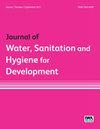Water, sanitation, and hygiene facilities: enabling or impeding handwashing? An assessment of a primary school infrastructure in Palwal, India
IF 1.4
4区 环境科学与生态学
Q3 WATER RESOURCES
Journal of Water Sanitation and Hygiene for Development
Pub Date : 2023-09-05
DOI:10.2166/washdev.2023.136
引用次数: 0
Abstract
The importance of water, sanitation, and hygiene (WASH) facilities in school cannot be ignored in protecting children from communicable diseases. However, reports from UNICEF suggest that there is a lack of adequate WASH facilities as well as the dearth of adequate data on available facilities, particularly from developing countries. The present study sought to address this gap and build on the evidence-base of school hygiene and sanitation facilities in rural India. The study also assessed the association between available facilities and the handwashing behavior of students. Data were collected from 28 schools using a modified Joint Monitoring Program (JMP) observation checklist and a self-administered questionnaire. Results indicate a universal coverage of WASH facilities in the sampled schools, though the sufficiency and usability of the infrastructure were inadequate. The study also found better hand hygiene KAP scores among students in schools that had handwashing stations closer to toilets (p = 0.018). We conclude that while India has improved access to facilities under the recent National policy push, there needs to be a continued focus on increasing sufficiency, maintenance and usability of the facilities. Additionally, health promotion activities that include teachers, parents and the community are required to improve the hygiene and sanitation behavior of school children.水、环境卫生和个人卫生设施:允许还是阻碍洗手?对印度帕尔瓦尔小学基础设施的评估
学校水、环境卫生和个人卫生设施在保护儿童免受传染病侵害方面的重要性不容忽视。然而,来自儿童基金会的报告表明,缺乏足够的讲卫生设施,也缺乏关于现有设施的充分数据,特别是来自发展中国家的数据。本研究试图解决这一差距,并建立在印度农村学校卫生和卫生设施的证据基础上。该研究还评估了可用设施与学生洗手行为之间的关系。使用改进的联合监测计划(JMP)观察清单和自我管理问卷从28所学校收集数据。结果表明,抽样学校普遍覆盖了讲卫生设施,尽管基础设施的充分性和可用性不够。该研究还发现,在离厕所更近的洗手站的学校,学生的手卫生KAP得分更高(p = 0.018)。我们的结论是,虽然印度在最近的国家政策推动下改善了对设施的使用,但需要继续关注提高设施的充足性、维护和可用性。此外,需要开展包括教师、家长和社区在内的健康促进活动,以改善学童的个人卫生和环境卫生行为。
本文章由计算机程序翻译,如有差异,请以英文原文为准。
求助全文
约1分钟内获得全文
求助全文
来源期刊

Journal of Water Sanitation and Hygiene for Development
WATER RESOURCES-
CiteScore
3.10
自引率
11.80%
发文量
58
审稿时长
16 weeks
期刊介绍:
The Journal of Water, Sanitation and Hygiene for Development is a peer-reviewed journal devoted to the dissemination of high-quality information on the science, policy and practice of drinking-water supply, sanitation and hygiene at local, national and international levels.
 求助内容:
求助内容: 应助结果提醒方式:
应助结果提醒方式:


